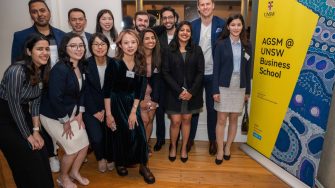AGSM ranks among the world’s top Full-Time MBA Programs in 2024 global rankings
AGSM @ UNSW Business School has jumped 16 positions in the Financial Times' annual ranking of the world's top 100 MBA programs.
AGSM @ UNSW Business School has jumped 16 positions in the Financial Times' annual ranking of the world's top 100 MBA programs.

AGSM’s full-time MBA program has ranked 79th in the 2024 Financial Times latest rankings of the world’s top global MBA programs – up 16 places from last year. AGSM has consistently been ranked in the top 100 programs globally for nearly 25 consecutive years.
AGSM remained one of the highest-ranked programs in the world for Sector Diversity (5); International Mobility (15); International Course Experiences (16), and ESG / Net Zero Teaching (22). Sector diversity is calculated according to the diversity of sectors students worked in at the time of admission to the MBA program.
Professor Nick Wailes, AGSM Director and Senior Deputy Dean UNSW Business School, says that maintaining a top global MBA program ranking speaks volumes about the quality of MBA candidates the program attracts, a focus on sustainable business practice, experiential program design and academic rigour, collaboration with industry, and alumni engagement.
“A high ranking in sector diversity is the result of our intentional focus on recruiting a global cohort with different personal and professional backgrounds. This co-reflects the high rankings in international mobility and course experiences,” says Professor Wailes.
“It's great to see that AGSM's ESG has once again received acknowledgment in the rankings, climbing three spots from 2023 to now stand at 22nd place,” he said.
ESG and Net Zero teaching ranking is based on a proportion of teaching hours from core courses dedicated to ethics, social, environmental issues and climate solutions for how organisations can reach net zero. The alumni evaluation of their school's ESG teaching is also included.
"The rankings outcomes reflect AGSM's dedication to sustainable business practices and responsible leadership. Our focus is to prepare a new generation of leaders to create an impact in a rapidly evolving world and foster sustainability and inclusivity," he continued.
AGSM scored highly for International Mobility (15) and International Course Experience (16). International Mobility is based on alumni citizenship and the locations where alumni worked before their MBA, on completion and three years after. International Course Experience is calculated according to whether the most recent completing class carried out exchanges and internships, lasting at least a month, in countries other than where the school is based.
Associate Professor Michele Roberts, AGSM Academic Director & Associate Dean at UNSW Business School, says, “AGSM's continual positioning in the global MBA rankings shows our unwavering commitment to excellence and innovation in education. The opportunities for exchanges and internships on a global scale allow our students to experience a multicultural educational journey, preparing our students for success in an interconnected world.”
“Our high rankings on sector diversity, international mobility, and ESG integration reflect our dedication to empowering diverse leaders to make a meaningful impact in an accelerating world. This acknowledgment reaffirms our mission to cultivate responsible leadership and drive positive change in a dynamic global landscape," said Roberts.
# # #
The Financial Times Global MBA Rankings are calculated based on 20 criteria. Alumni responses inform eight criteria that together contribute 61% of the ranking. Eleven criteria are calculated from school data, accounting for 29% of the ranking. KPMG audits a number of schools every year. The remaining criterion, the research rank, counts for 10%.
For more information and to view the full rankings results, click here.
For any related media enquiries, please contact Katie Miller, News and Content Coordinator for UNSW Business School, katie.miller1@unsw.edu.au